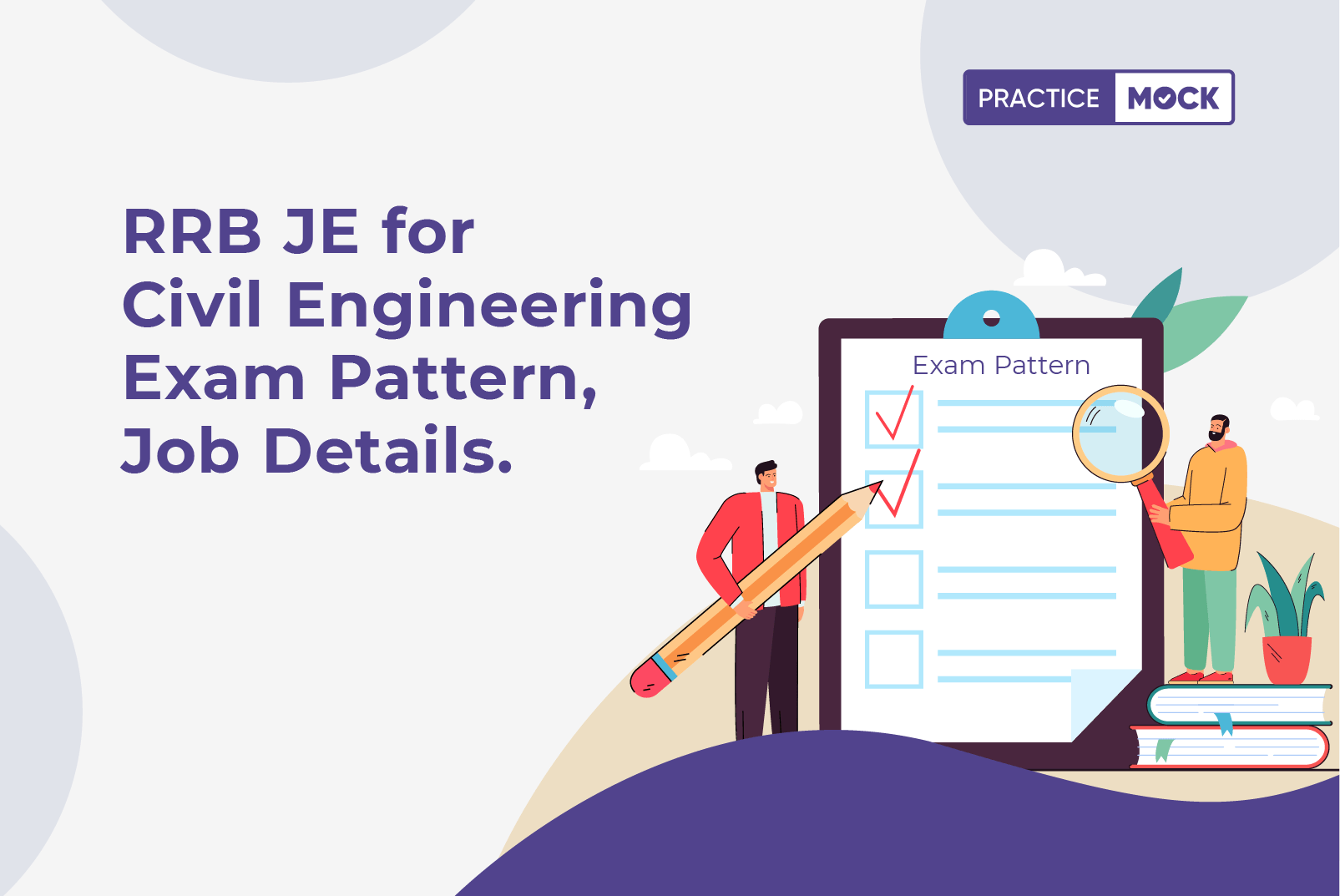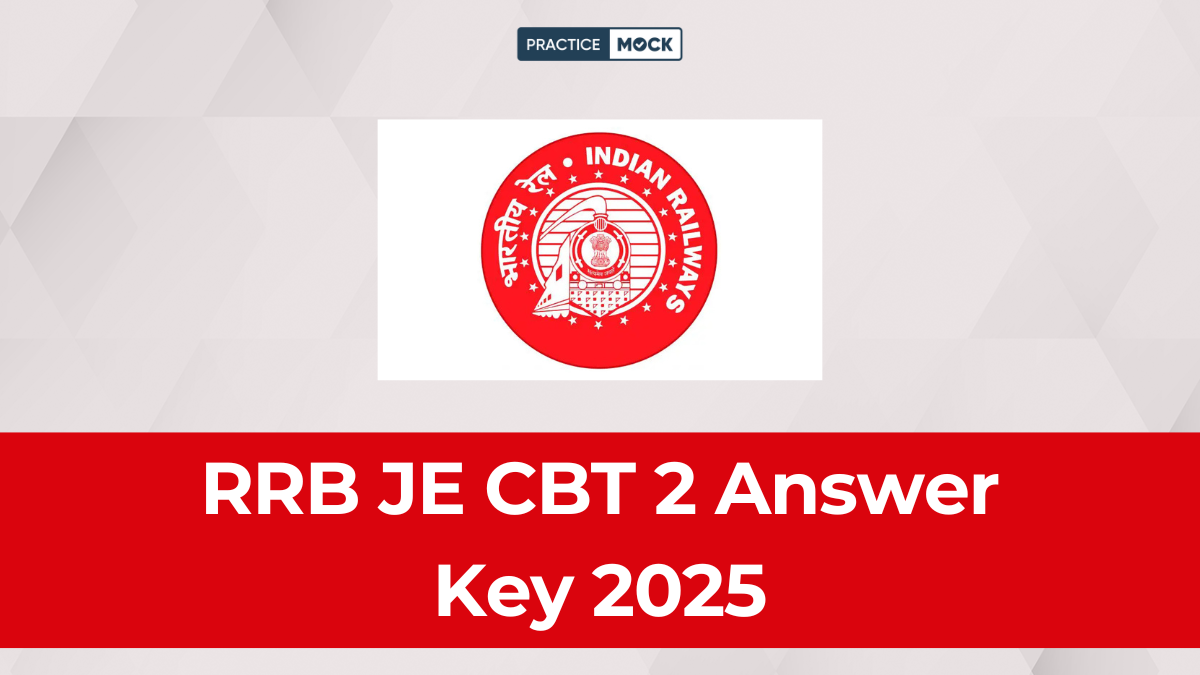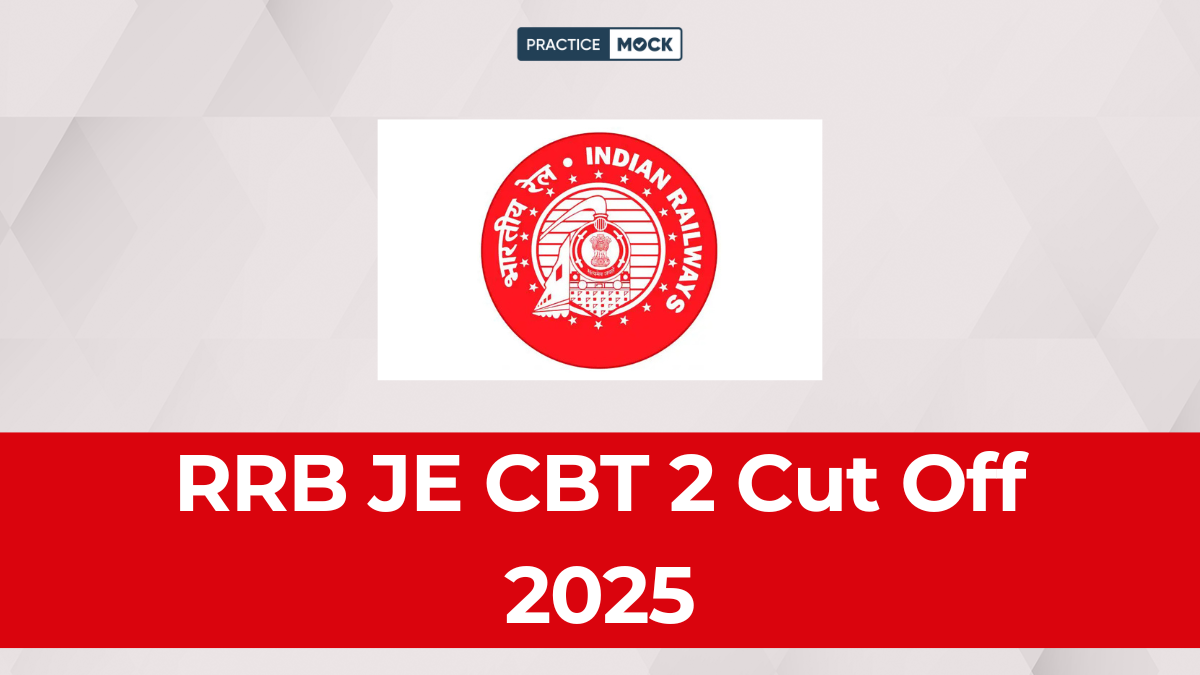

Introduction
Railway Recruitment Board (RRB) Junior Engineer (JE) exam is one of the most sought-after exams in the country for Civil Engineering graduates. The exam is conducted by the Railway Recruitment Board to recruit Junior Engineers in various departments of Indian Railways. This article will provide you with an in-depth understanding of the RRB JE Civil Engineering Exam pattern, job details, and other relevant information.
Sign Up for a Free Mock Test of RRB JE
RRB JE Civil Engineering Exam Pattern
The RRB JE Civil Engineering exam is conducted in three stages: Computer Based Test (CBT) – 1, CBT – 2, and Document Verification/Medical examination. Let us look at each step of the exam in detail.
CBT – 1
The first stage of the RRB JE Civil Engineering exam is a Computer Based Test (CBT) that consists of 100 objective-type questions that have to be answered in 90 minutes. The CBT-1 exam is divided into four sections – Mathematics, General Intelligence and Reasoning, General Awareness, and General Science. The weightage of each section is as follows:
Sign Up for a Free Mock Test of RRB JE
- Mathematics: 30 marks
- General Intelligence and Reasoning: 25 marks
- General Awareness: 15 marks
- General Science: 30 marks
- The questions asked in the exam are of a basic level and test the candidate’s knowledge in their respective fields. The questions asked in the Mathematics section are from topics such as Algebra, Geometry, Trigonometry, and Mensuration. The questions in the General Intelligence and Reasoning section test the candidate’s analytical and logical reasoning abilities. The General Awareness section tests the candidate’s knowledge of current affairs and general knowledge. The General Science section tests the candidate’s knowledge of Physics, Chemistry, and Biology.
CBT – 2
Candidates who clear the CBT-1 exam will be eligible to appear for the CBT-2 exam. The CBT-2 exam is also a Computer Based Test that consists of 150 objective-type questions that have to be answered in 120 minutes. The CBT-2 exam is also divided into four sections – General Awareness, Physics and Chemistry, Basics of Computers and Applications, and Basics of Environment and Pollution Control. The weightage of each section is as follows:
Sign Up for a Free Mock Test of RRB JE
- General Awareness: 15 marks
- Physics and Chemistry: 15 marks
- Basics of Computers and Applications: 10 marks
- Basics of Environment and Pollution Control: 10 marks
- In addition to the four sections mentioned above, there is also a fifth section that is specific to the candidate’s branch. For Civil Engineering candidates, this section is called Civil and Allied Engineering and consists of 100 questions with a weightage of 100 marks. The questions asked in this section are from topics such as Linear Algebra, Engineering Mechanics, Soil Mechanics, Estimating, Fluid Mechanics, & ETC.
Document Verification/Medical Examination
Candidates who clear the CBT-2 exam will be called for Document Verification (DV) and Medical Examination. The DV process involves verifying the candidate’s documents and certificates to ensure that they meet the eligibility criteria. The Medical Examination is conducted to ensure that the candidate is physically and medically fit to perform the duties of a Junior Engineer.
Job Details
After clearing all the stages of the RRB JE Civil Engineering exam, candidates will be recruited as Junior Engineers in various departments of Indian Railways. The job profile of a Junior Engineer involves:
Sign Up for a Free Mock Test of RRB JE
Designing and drawing plans for railway construction projects Supervising the construction and maintenance of railway tracks, bridges, and buildings Inspecting and ensuring the safety of railway structures and equipment
Coordinating with other departments to ensure the smooth functioning of railway operations Planning and executing maintenance activities to ensure the smooth functioning of railway operations
Salary
As a Junior Engineer in Indian Railways, candidates can expect a decent salary package and a host of benefits such as medical facilities, leave, and travel allowances. The salary structure of a Junior Engineer in Indian Railways varies based on their location, department, and years of experience. However, on average, a Junior Engineer can expect a salary of Rs. 35,000 – 40,000 per month.
Apart from a decent salary, there are several other benefits of being a Junior Engineer in Indian Railways. Some of the benefits include:
- Job Security: Indian Railways is one of the largest employers in the country, and a job in this sector provides a high level of job security.
- Growth Opportunities: Indian Railways provides its employees with ample growth opportunities, both in terms of career advancement and personal development.
- Work-Life Balance: Indian Railways provides its employees with an excellent work-life balance, with fixed working hours and extended leave and holiday allowances.
- Pension Benefits: Indian Railways also provides its employees with pension benefits, which ensures that they are financially secure even after retirement.
Conclusion
The RRB JE Civil Engineering exam is a great opportunity for Civil Engineering graduates who are looking to join the Indian Railways. The exam pattern is relatively simple, and with the right preparation, candidates can easily clear all the stages of the exam. Once recruited, candidates can expect a decent salary package, job security, and a host of benefits. So, if you are a Civil Engineering graduate looking for a stable and fulfilling career in the Indian Railways, the RRB JE Civil Engineering exam is definitely worth considering.
Sign Up for a Free Mock Test of Civil Engineering
[table “26” not found /]Follow us on Instagram – Click here
Recent Posts
Ancient Indian History SSC CGL PDF, Download For Free
In this blog, we have provided the Ancient Indian History PDF for SSC CGL. The…
SBI CBO Syllabus 2025, Check Exam Pattern
SBI CBO Syllabus 2025, check latest Exam Pattern: Know the syllabus and exam pattern for…
UPSC CSAT Free Preparation Resources, Check Tips to Prepare Well
In this blog, we have provided the UPSC CSAT Free Preparation Resources. Candidates must attempt…
Documents Required for SSC CGL 2025 Recruitment
This blog has provided the complete list of Documents Required for SSC CGL 2025 Recruitment…
Is It Possible to Prepare for RBI Grade B Exam 2025 in Just 4 Months?
Let’s be honest — four months might not sound like a lot when you hear…
The Hindu Editorial Vocabulary 12th May 2025
Here we are providing the Hindu Editorial Vocabulary 12th May 2025. Candidates can check words…


